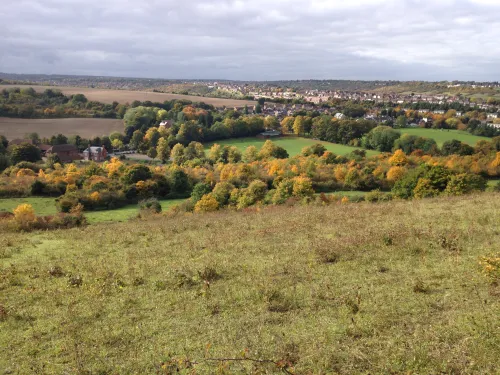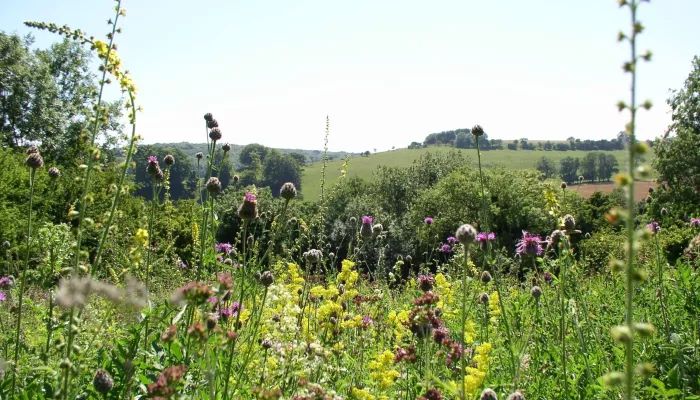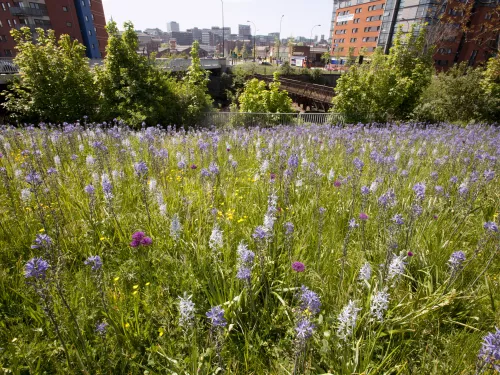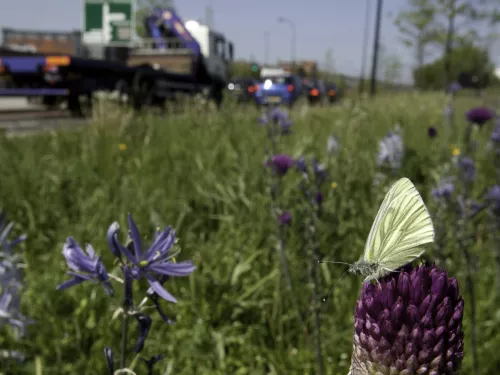
Biodiversity Net Gain
Biodiversity Net Gain (BNG) is a way of creating and improving natural habitats by ensuring that development has a measurably positive impact (‘net gain’) on biodiversity, compared to what was there before development.

The latest development in the Government’s plan to speed up development has brought proposed changes to the way that BNG is implemented. We need your help to speak up for nature before the consultation closes on the 24th of July.
We are regularly contacted by our members and other concerned residents about the impact that development, when done badly, can have on the environment. We share your concern and work to give nature a voice in the planning system, both through our own responses and in encouraging others to submit their own. One of the key tools helping to do this is Biodiversity Net Gain (BNG), a policy that ensures wildlife and habitats are not only considered during development but left better off. It's helped shift the planning system toward valuing nature, avoiding damage where possible, and creating new, high-quality habitat when development does go ahead.
Now, a government consultation is proposing changes that could seriously weaken how BNG works. We want to make sure you’re aware of this and to ask for your support in standing up for nature at this crucial moment.
This latest consultation claims to “improve the implementation of BNG for minor, medium, and brownfield development” but once again, the focus is on accelerating development, with little regard for meaningful gains for biodiversity. It's yet another example of the Government breaking its promises to protect wildlife and tackle the nature and climate crisis.
We cannot solve the housing crisis in isolation. Nature recovery and climate action must go hand in hand with development. Prioritising growth at the expense of ecosystems is not only short-sighted, it fundamentally ignores the value of nature and the reality that human wellbeing depends on healthy, functioning ecosystems.
You can help by responding on The Wildlife Trusts' website. This is a quick and easy way for you to play your part in opposing these changes!
All you need to do beyond inputting your personal details is write a 300-word response detailing why you think development should give back to nature.
Here are some suggestions of what you could include in your response:
A worrying narrative runs through this consultation: many of the proposed changes to Biodiversity Net Gain (BNG) appear to be driven by the fact that developers are finding the current requirements difficult to meet. BNG legislation should not be relaxed due to developments finding it challenging. Whilst we recognise that some slight modifications to BNG delivery would result in improved outcomes for growth and nature in tandem, this does not require a total overhaul of the current system. In part, BNG has been signed to disincentivise the loss of important habitats and so in some “challenging” cases BNG is just doing it’s job as intended. This narrative, however, paints nature as an obstacle rather than recognising it as vital infrastructure, essential to long-term resilience and wellbeing.
One of the most troubling proposals is the removal of legally binding BNG requirements for small sites. These sites make up a significant share of planning applications and exempting them would lead to widespread biodiversity loss and a major drop in investment in nature’s recovery. This requirement must remain in place. We strongly oppose its removal and urge the Government to uphold its commitment to nature-positive planning.
We're concerned about the following:
There are some positive suggestions which we are supportive of:
There is also discussion of the biodiversity gain hierarchy. We would support a review of the application of this hierarchy TO AN EXTENT. It has been observed that larger developments are more likely to be able to deliver all of their BNG requirement on-site, with greater chance of being able to secure and manage higher quality habitats. In comparison, applicants of small and medium developments are reporting significant difficulties in achieving BNG on site, resulting in habitats trying to be “squeezed” into small development sites or small pockets of off-site delivery being secures. This “piecemeal” approach to BNG which does not align with the goal of achieving real nature recovery. Greater weighting could be afforded to off-site delivery – with specific focus on strategic off-site delivery of BNG. This should not negate the need to follow the mitigation hierarchy or Biodiversity Gain Hierarchy with avoidance being the first port of call.
The consultation closes on the 24th of July - responses will need to be in by then.
We absolutely recognise that there is a housing crisis and that one of the ways to address this is for new homes to be built.
However, like so many members of the public, we think it is important to build homes in a way that helps wildlife. We also know that this is possible, and it helps boost the health and wellbeing of communities.
Before entering Government, Labour pledged to protect nature. But now they're breaking that promise. Here is a simple way you can speak up for nature!
Join our mailing list to stay updated on our latest advocacy campaigns and find out how you can help us defend nature.

Biodiversity Net Gain (BNG) is a way of creating and improving natural habitats by ensuring that development has a measurably positive impact (‘net gain’) on biodiversity, compared to what was there before development.

Biodiversity Net Gain (BNG) is coming, and it’s coming fast. With it comes huge opportunity and significant risk. Either way, it’ll be one of the biggest changes to UK conservation funding for decades. So what is it? Read on to find out more.

Kent Wildlife Trust Group have developed detailed due diligence processes for projects, buyers and sellers to ensure we only work with partners who are also demonstrating a desire to support nature.